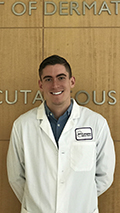2017 Award and Grant Recipients
Below are brief biographies for American Skin Association's 2017 grantees. Among the information included is the title of the grant, the name of the sponsoring institution and the focus of the grant recipient's research.
-

Dr. Cory Simpson
2017 ASA Carson Research Scholar Award in Psoriasis
ASA Carson Research Scholar Award in Psoriasis
Topic: Role of Autophagy in Psoriasis PathogenesisCory Simpson, MD, PhD is a Clinical Instructor and Post-doctoral Fellow in the Department of Dermatology at the University of Pennsylvania. He graduated summa cum laude with an A.B. (Biology) from Washington University in St. Louis then earned his MD and PhD (Cell Biology) via the Medical Scientist Training Program at Northwestern University in Chicago. After an internal medicine internship through the University of Chicago, he completed clinical dermatology training at the Hospital of the University of Pennsylvania through the physician-scientist track. Dr. Simpson began post-doctoral research in 2015 working in the Department of Physiology at Penn under the mentorship of Erika Holzbaur, PhD whose lab has linked defects in the specialized cellular degradative pathway called autophagy to neurodegenerative diseases. In the Holzbaur Lab, Dr. Simpson is coupling advanced live cell imaging via two-photon and confocal microscopy with a three-dimensional model of human epidermis to better understand how autophagy may drive keratinocyte organelle and nuclear break-down to allow epidermal cornification. Recent evidence suggests that defective autophagy plays an important role in the pathogenesis of psoriasis, which is characterized by nuclear retention, hyperproliferation, and defective differentiation. Dr. Simpson’s current studies aim to elucidate the mechanisms by which selective autophagy receptors target keratinocyte organelles and nuclei for degradation during cornification and will test whether these mechanisms are impaired in psoriatic epidermis. Importantly, while much research in psoriasis has focused on immunologic regulation, delineating the contribution of autophagy to organelle and nuclear turnover in the skin may suggest novel therapeutic strategies to normalize differentiation in psoriatic epidermis.
-

Dr. Willy Hugo
2017 ASA Milstein Research Scholar Award Melanoma/Non-melanoma Skin Cancer
The Regents of the University of California, Los Angeles
Topic: A Novel Combination of MAPK and Immune Checkpoint Inhibition for MelanomaWilly Hugo, PhD is currently an Assistant Adjunct Professor at the Division of Dermatology, Department of Medicine, UCLA. He earned his PhD in Computational Biology from the National University of Singapore in 2011. He is working under the mentorship of Roger S. Lo MD, PhD focusing on analyzing the genome, transcriptome, methylome, regulome and proteome of patient and melanoma models (murine, patient-derived xenografts, cell lines) to nominate and validate genes and pathways which affect melanoma's sensitivity/resistance toward targeted-, epigenetic- and immunotherapies. His work ultimately aims towards translation of such knowledge to improve patient treatment outcome.
-

Dr. Jillian Richmond
2017 ASA Calder Research Scholar Award in Vitiligo/Pigment Cell Disorders
University of Massachusetts Medical School
Topic: Determining Mechanisms of Melanocyte Killing in VitiligoJillian Richmond, PhD is an Instructor in the Department of Dermatology at the University of Massachusetts Medical School. Dr. Richmond earned her undergraduate degree in Molecular and Cellular Biology from the Johns Hopkins University, and her doctoral degree in Pathology and Immunology from Boston University School of Medicine. She performed a postdoctoral fellowship in chemokine biology at Massachusetts General Hospital before moving to the Harris Lab at the University of Massachusetts Medical School to study chemokines in vitiligo. Her postdoctoral work examined which cells in the skin produce chemokines to drive vitiligo pathogenesis, which was funded by an American Skin Association Research Grant. In the first year of funding from the Calder Research Scholar Award, Dr. Richmond studied how subsets of autoreactive memory T cells navigate through the dermis. Her current research focuses on determining how autoreactive T cells kill melanocytes at the dermal-epidermal junction.
-

Dr. Anjali Mishra
2017 ASA Research Scholar Award
The Ohio State University
Topic: Targeting IL-15 Signaling Pathway in Cutaneous T-cell LymphomaAnjali Mishra, PhD received her BS at the University of Delhi in New Delhi, India. She received her PhD at the Hannover Medical School in Hannover, Germany. Her post-doctoral fellowship is at The Ohio State University Wexner Medical Center where she is currently Assistant Professor, Internal Medicine.
Dr. Mishra’s laboratory studies the effect of chronic inflammation in cancers. The clinical objective of Dr. Mishra’s research group is to devise novel therapeutics for human clinical investigation in Dermatologic/Hematologic malignancies. Dr. Mishra's research has shown stage-related ‘interleukin-15 (IL-15)’ mRNA and protein over-expression in lesional skin and circulating tumor cells of CTCL patients. Using IL-15 transgenic (tg) mice, Dr. Mishra's lab has characterized an animal model of spontaneous epidermotropic T-cell lymphoma that clinically and pathologically mimics human CTCL. The research efforts of her laboratory are concentrated on understanding the mechanisms of lymphomagenesis and designing therapeutic strategies for CTCL, by characterizing and targeting deregulated oncogenic pathways in IL-15 tg mice and CTCL patients. Dr. Mishra is an active member of the Molecular Carcinogenesis and Chemoprevention Program of the OSU Comprehensive Cancer Center. As a cancer researcher, she participates in program meetings, seminars and collaborative efforts such as programmatic grants and shared resource usage to further the goal of the OSUCCC in conducting basic and clinical research on the prevention, detection and therapy of cancer specifically Cutaneous T-cell lymphoma.
-

Dr. Kavita Sarin
2017 ASA Research Scholar Award
Stanford University
Topic: Repurposing Systemic Therapies to Improve Outcomes in Advanced Basal Cell CancerKavita Sarin MD, PhD is an Assistant Professor in the Department of Dermatology at Stanford University. Dr. Sarin earned her undergraduate degree in Computer Science, her doctoral degree in Genetics, and medical degree from Stanford University. Her current work focuses on integrating molecular and genetic data to inform susceptibility, stratify prognosis and direct treatment in non-melanoma skin cancer. Her research, funded by an American Skin Association Research Grant, utilizes genetic and molecular information to discover and test new molecular-based therapeutics for basal cell cancer.
-

Dr. Chiara Vardabasso
2017 Research Grant for Skin Cancer and Melanoma
Mount Sinai School of Medicine
Topic: Towards Selective Inhibition of BET Proteins in MelanomaChiara Vardabasso, PhD is an Instructor in the Departments of Oncological Sciences and Dermatology at the Icahn School of Medicine at Mount Sinai, NYC. Dr. Vardabasso graduated from the University of Trieste, Italy. She then earned her PhD in Molecular Biology from Scuola Normale Superiore di Pisa in collaboration with the International Center of Genetic Engineering and Biotechnology (ICGEB), Trieste, Italy. The overarching goal of Dr. Vardabasso’s research is to decipher how disruption of the cellular epigenetic balance contributes to human disease. Her PhD training involved dissecting the mechanisms of gene expression programs mediated by HIV-1 (Human Immunodeficiency Virus-1) and other Retroviruses. As a postdoctoral fellow in Dr. Bernstein’s lab, she aspired to characterize the chromatin changes that occur during cancer development and progression, with a focus on malignant melanoma - a deadly disease that currently lacks a cure. In particular, her mechanistic studies shed light on the previously unrecognized roles of histone variants (such as H2A.Z and macroH2A) and their chaperones in melanoma pathogenesis. Dr. Vardabasso is strongly committed to continue her characterization of the melanoma epigenome, with the ultimate goal to identify novel and druggable melanoma drivers. These epigenetic regulators may provide new therapeutic targets to be used as alternatives or in a complementary fashion to the classical inhibition of signaling pathways.
-

Dr. Victor Huang
2017 Research Grant for Vitiligo and Pigment Cell Disorders
Brigham and Women's Hospital
Topic: Variation of Serum and Local Inflammatory Markers in Individuals with Autoimmune DepigmentationVictor Huang, MD is the Director of the Vitiligo Clinic at Brigham and Women’s Hospital in Boston, Massachusetts. He earned his BS in Biochemical Sciences (2003) from Harvard College, his MD from the University of California in San Francisco (2008), and completed his clinical residency at Washington University in St. Louis (2012). He completed a Howard Hughes Medical Institute Fellowship in the laboratory of Dr. Samuel Hwang (2007) and a post-doctoral fellowship in the laboratory of Rachael Clark (2014). Since that time, Dr. Huang has focused his career on understanding inflammatory conditions in the skin, and in particular is interested in epidemiologic, clinical, and translational characterization of vitiligo.
-

Dr. Eddy Wang
2017 Research Grant for Psoriasis/Inflammatory Skin Diseases
The Trustees of Columbia University in the City of New York
Topic: Reversal of Alopecia Areata via Topical Histone Deacetylase InhibitorsEddy Hsi Chun Wang, PhD is a postdoctoral research scientist at the Department of Dermatology, Columbia University Medical Center under the supervision of Dr. Angela Christiano. Eddy earned his PhD in Experimental Medicine from the University of British Columbia, Canada in 2014. Eddy is exploring different mechanisms involved in the pathogenesis of alopecia areata in Dr. Christiano’s lab, with a specific focus on epigenetic regulations during the development of alopecia areata and potentially utilize epigenome-modifying drugs as a new class of therapy for the disease.
-

Dr. Joy Wan
2017 Research Grant for Childhood Skin Disease/Disfigurement
University of Pennsylvania
Topic: Investigation of Systemic Medications and Phototherapy for Pediatric Atopic DermatitisJoy Wan, MD is a post-doctoral fellow and clinical instructor of dermatology at the University of Pennsylvania. Dr. Wan received her medical degree from the University of Pennsylvania and completed her dermatology residency at the Hospital of the University of Pennsylvania. She is currently pursuing a Master of Science in Clinical Epidemiology as part of her post-doctoral training. Her research is focused on the epidemiology and treatment of atopic dermatitis.
-

Dr. Aaron Secrest
2017 Research Grant for Quality of Life/Health Services/Outcome Studies
University of Utah Dermatology
Topic: The Effect of Pain and Pruritus on Quality of Life in Patients with Autoimmune Bullous DiseaseAaron Secrest, MD, PhD is an Instructor in the Departments of Dermatology and Population Health Sciences at the University of Utah. He received his medical and research training at the University of Pittsburgh, earning a Master's Degree in Public Health and a PhD in epidemiology (population health research). His academic interests are increasingly focused around patient-centered care and outcomes. He is currently developing a system-wide computer and tablet-based platform to collect patient reported outcomes data for all dermatologic conditions at every patient visit at the University of Utah Clinics. This information from patients will be invaluable in optimizing care and treatment algorithms in dermatology and understanding and recognizing the extent to which patients' skin disorders affect their daily lives.
His dermatology research to date has centered around patient motivations and preferences with care, as well as the problem of increasing medication costs to the patient and the healthcare system overall. He successfully obtained an NIH training grant during his MD/PhD training. He has co-authored more than 30 journal articles and a book chapter in the NIH publication Diabetes in America. Dr. Secrest is a member of the American Academy of Dermatology's Drug Pricing and Transparency Task Force as well as serving on several committees within the Department of Dermatology. He also serves as a reviewer for several journals, including JAMA Dermatology. He is deeply committed to mentoring and training faculty, residents, and medical students in clinical and epidemiologic research.
-

Ms. Sarah Ahmed
2017 ASA Hambrick Medical Student Grants Targeting Melanoma & Skin Cancer Research
Sidney Kimmel Medical College at Thomas Jefferson University
Topic: Genetic Engineering of Melanoma-targeting T-cells in Tumor-bearing HostSarah Ahmed is a second year medical student at Sidney Kimmel Medical College at Thomas Jefferson University. She graduated from Pennsylvania State University through the accelerated Premedical-Medical Program with a Bachelor's Degree in Science, and plans to continue her research in melanoma immunotherapy. Originally from Wallingford, Pennsylvania, she is also currently exploring the world of clinical research, from projects ranging from improving dermatology resident education and patient satisfaction to examining interesting cases in dermatopathology.
-

Ms. Hyunje Grace Cho
2017 ASA Hambrick Medical Student Grants Targeting Melanoma & Skin Cancer Research
Stanford School of Medicine
Topic: Clinical and Genetic Risk Factors in Individuals with High Frequency of Basal Cell CarcinomasHyunje Grace Cho is a fourth year student at Stanford University School of Medicine. She graduated from Harvard University with a Bachelor’s Degree in Molecular and Cellular Biology and a secondary in Health Policy. Her current research focuses on the clinical risk factors and genetic biomarkers in patients who develop high frequency of basal cell carcinoma. Grace was born in Seoul, South Korea and grew up in Cupertino, California and Grosse Pointe, Michigan.
-

Mr. Michael Gowen
2017 ASA Hambrick Medical Student Grants Targeting Melanoma & Skin Cancer Research
New York University School of Medicine
Topic: Impact of a Germline Variant on Response to Target Therapy in BRAF Wild-type MelanomaMichael Gowen is a fourth-year MD/MBA student at Tufts University School of Medicine. He is currently conducting a year of research with Dr. Iman Osman at NYU School of Medicine, where he is studying the treatment of wild-type melanoma through targeted therapy in a subpopulation who harbor a germline variant in VEGFR2. He graduated summa cum laude from the University of Pittsburgh with a Bachelors of Science in Neuroscience. His undergraduate research focused on the anatomical mapping of vestibular inputs to the brainstem and how this impacts autonomic regulation. He is originally from central Pennsylvania.
-

Mr. Edward Kim
2017 ASA Hambrick Medical Student Grants Targeting Melanoma & Skin Cancer Research
Boston University School of Medicine
Topic: p300 Mediates Melanoma Cell Growth and Survival Through the Transcriptional Regulation of MITFEdward Kim is a fifth-year MD/PhD student at the Boston University School of Medicine (BUSM). He graduated from Swarthmore College where he studied biology and photography. His undergraduate research focused on fate specification of neural progenitor cells in the brain with his research mentor Yuan Zhu, PhD. (Gilbert Family Neurofibromatosis Institute. Research Division Chief). Edward is currently studying epigenetic regulations involved in melanoma development and survival under the guidance of Rhoda M. Alani, MD. He is originally from New York, NY.
-

Mr. Anand Rajan
2017 ASA Hambrick Medical Student Grants Targeting Melanoma & Skin Cancer Research
The Regents of the University of California, Los Angeles
Topic: Evaluating the Role of AIM2 in MelanomaAnand Rajan is a second year medical student at the David Geffen School of Medicine at UCLA. He is currently performing research in the Kulkarni Lab on the AIM2 inflammasome, a protein complex involved in the innate inflammatory response to foreign DNA, and its role in the pathogenesis of melanoma metastasis. He hopes to pursue basic science research on melanoma and autoinflammatory disorders of the skin as a dermatologist in the future.
-

Ms. Pooja Rambhia
2017 ASA Hambrick Medical Student Grants Targeting Melanoma & Skin Cancer Research
Case Western Reserve University School of Medicine
Topic: Investigating the Functional Role of a Novel Germline XPC Mutation in a High Risk Melanoma FamilyPooja Rambhia is a 3rd year medical student at Case Western Reserve University School of Medicine. She graduated magna cum laude with a Bachelor of Arts in Biochemistry from Case Western Reserve University in 2013. Her undergraduate research investigated the use of a plant virus platform for human viral peptide conjugation with applications in HIV and cancer immunology. She is currently pursuing a year of basic science research in the Department of Dermatology at University Hospital Cleveland Medical Center exploring the role of early genetic changes in the initiation of high-risk melanoma families in Dr. Joshua Arbesman’s lab. Ms. Rambhia is originally from Long Island, New York.
-

Ms. Andrea Schneider
2017 ASA Hambrick Medical Student Grants Targeting Melanoma & Skin Cancer Research
Penn State University College of Medicine
Topic: IL-6 Drives the Expression of an EMT-like Phenotype in Squamous Cell CarcinomasAndrea Schneider is a third year MD/PhD candidate at Penn State College of Medicine. After completing the first two years of medical training, she joined the lab of Amanda Nelson, PhD in the Department of Dermatology. Here she is studying the innate immune system and its role in Non-Melanoma Skin Cancer formation. She completed her Bachelors of Science in Biochemistry at the University at Buffalo in 2014. Her undergraduate research focused on cancer pharmacology and novel therapeutics.
-

Ms. Amanda Truong
2017 ASA Hambrick Medical Student Grants Targeting Melanoma & Skin Cancer Research
University of Utah School of Medicine
Topic: Investigating Enhanced Melanoma Invasion as an Emergent Property of Targeted Therapy ResistanceAmanda Truong is a third year MD/PhD student at the University of Utah School of Medicine. She received her Bachelor’s Degree in zoology from Weber State University. After her second year of medical school, she was selected for a year-long research fellowship at the National Institutes of Health where she investigated innate lymphoid cells in the skin. Her current work involves studying melanoma metastasis in the setting of targeted therapy resistance. Amanda is originally from the United Kingdom and grew up in Ogden, Utah.
Recipients list by year:
2024 |2023 | 2022 | 2021 | 2020 | 2019 | 2018 | 2017 | 2016 | 2015 | 2014 | 2013 | 2012




